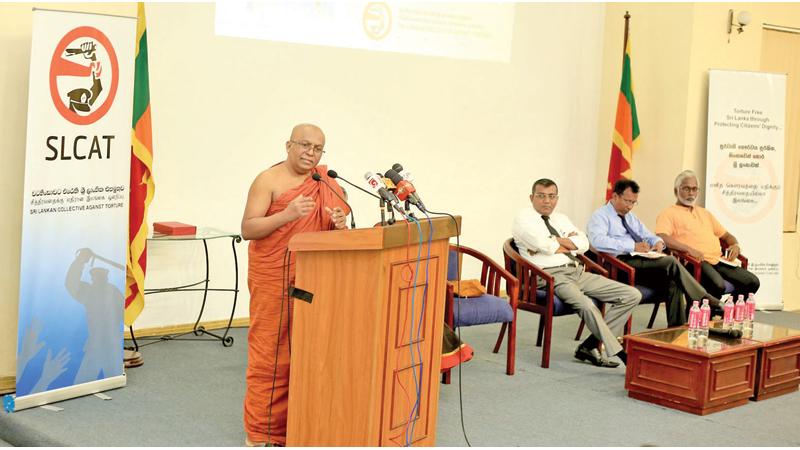
Buddhism does not encourage violence even at the cost of one’s life. According to Buddhism, sacrificing one’s life is better than resorting to violence, said Ven. Galkande Dammananda Thera.
He was speaking at a panel discussion themed ‘Torture Free Sri Lanka through Protecting Citizens’ Dignity’ to mark United Nations International Day in Support of Victims of Torture, at the Light House auditorium, Kadirgamar Institute, Colombo last week.
Facing violent punishment as children is the main cause of violence in society, he said.
 The event organised by the Sri Lankan Collective Against Torture (SLCAT) was part of a month-long awareness program named ‘The Month Against Torture’ from June 19 to July 20, in different areas of the country.
The event organised by the Sri Lankan Collective Against Torture (SLCAT) was part of a month-long awareness program named ‘The Month Against Torture’ from June 19 to July 20, in different areas of the country.
The panel comprised J.C. Weliamuna PC, Journalist Ajith Parakum Jayasinghe and Human Rights Commissioner Ramani Muththettuwegama, while the discussion was moderated by Attorney-at-Law Upul Kumarapperuma.
Punishment in accordance with the wrong that was done, is recognised in the Hamurabi law from the times of the Mesopotamian Civilisation and was deeply ingrained in society. However, it had already been proved that this kind of one-for-one; eye-for-an-eye, tooth-for-a-tooth punishment cannot keep away torture and violence from society, said Dammananda Thera.
“All of us have at some time of our lives especially as children have been subject to punishment and violence. This kind of punishment teaches children that when they are faced with something that they don’t like, they can change it by using violence. What is usually done through punishment is to eliminate the effect. But, what needs to be done is to eliminate the cause of the wrong-doing,” he said.
Taking the example of the Jathaka story of Angulimala, he pointed out that though the king wanted to kill Angulimala and eliminate the effect; what the Buddha did was to change his thinking and to eliminate the cause.
There is no place for violence within Buddhism, not even for self-defence can you resort to violence. According to the Kakacupama Sutta, in case of self-defence it is better to chose death than resort to violence, he said.
Speaking on the problems of using law to stop violence and torture, J.C. Weliamuna PC, noted that there are many laws within the Sri Lankan judicial system which could be used to seek justice. People do not have to go to the Supreme Court itself and petition Human Rights violations. There are many instances where the lower courts, such as magistrate courts and the civil law was used to find solutions. Protecting human rights and eliminating torture and violence could not be done only by lawyers and the legal system but other professionals in varied fields, the religious and the society should all come together in protecting the human right of being free from torture, he said. Ajith Parakum Jayasinghe speaking on media’s role in creating a torture free Sri Lanka pointed out that media uses torture to sell their products, by sensationalising, exaggerating and romanticising torture. This would only promote torture and violence in society, instead what needs to be done is to present the truth as it is, he said.
The right to be free from torture, and protecting these human rights is not only the responsibility of the State but the responsibility of its citizenry as well, said Ramani Muththettuwegama, Commissioner HRCSL.
Taking the example of a recent incident at the Kollupitiya junction, she questioned the inaction of those around, simply being spectators. Instead of being spectators at an incident of violence, they could have collectively pushed the perpetrators and the victims to go to the police to settle the issue, she said.
However, the sad situation about human rights in the country is that though the perpetrators themselves accept that they had done wrong and though there is enough evidence to prove; the relevant institutions are reluctant to implement the recommendations of the HRCSL, she said.
